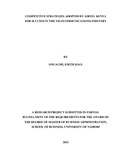| dc.description.abstract | Competitive strategy defines the fundamental decisions that guide the organization’s
marketing, financial management and operating strategies. Competitive strategy often
results in an organization adopting strategic change in the way it conducts its business.
Kenya’s telecommunications industry has great potential for growth because of its
previous low penetration levels in both fixed and mobile markets. The industry has
undergone significant changes, with the incumbent operator Telkom Kenya losing its
monopoly in the fixed-line and internationals band width sectors. The last one decade
has seen rapid growth due to new players entering the market, the introduction of 3G
services by the telecommunication operators and, very recently, duty being waived on
new mobile handsets and the allowing of number portability. This research therefore
sought to identify the competitive strategies being adopted by Airtel Kenya Limited to
tackle competition, and the challenges experienced in applying the strategies. A case
study research design was adopted. An interview guide was used to facilitate data
collection. The data obtained during interviews, through the interview guide, was
analyzed qualitatively using content analysis. The study found that the business
environment within which the mobile telephony sector operates has been very volatile.
The mobile industry’s rapid growth can be credited to the affordability of mobile
phones, lower interconnectivity charges, the infrastructural improvements by operators,
the presence of multiple players in the industry, and a stable regulatory environment,
among other things. The competitive advantage that Airtel Kenya has gained is that
their customers have become strongly attached to the differentiated attributes,
compared to the competitors, such as the data services that enable recognition of other
caller’s locations. The company faces the stiffest competition in the area of voice
service. The study recommends that, although Airtel has been successful in responding
to competition in the telecommunication industry and applying suitable competitive
strategies, it should engage in more cost reduction as a response to its competitors’
strategies. Airtel should deliver benefits that exceed those of competing products to
gain a competitive advantage over the firms. The company should undertake
appropriate, persuasive and sustained advertisement, marketing campaigns on products
and services. This would increase its customer base and competitiveness within the
industry. | en_US |

